Senior Vice President for Health Affairs
Candidate forums for the campus community were held on Oct. 28, 29 and 30. We sincerely thank the faculty and staff who took the time to attend the forums and submit candidate evaluation forms. Your input is essential to our decision-making process. The submission period has now concluded.
Position profile
Wayne State University (Wayne State), a premier public urban research university in the heart of Detroit that serves a diverse body of undergraduate and graduate students, seeks a dynamic, effective, forward-thinking leader for the newly redefined role of Senior Vice President for Health Affairs (SVP for Health Affairs). Wayne State’s next SVP for Health Affairs will have the extraordinary opportunity to join the University at an exciting period of transition and growth, as recently appointed President Kimberly Andrews Espy leads the institution toward continued and increasing prosperity. The successful candidate will be a collaborative, energetic leader who will build upon the University’s previous academic, research, and clinical successes. The role will inspire and support faculty and staff toward research productivity, while balancing a commitment to preparing healthcare professionals for service in the field and successful careers.
Wayne State University
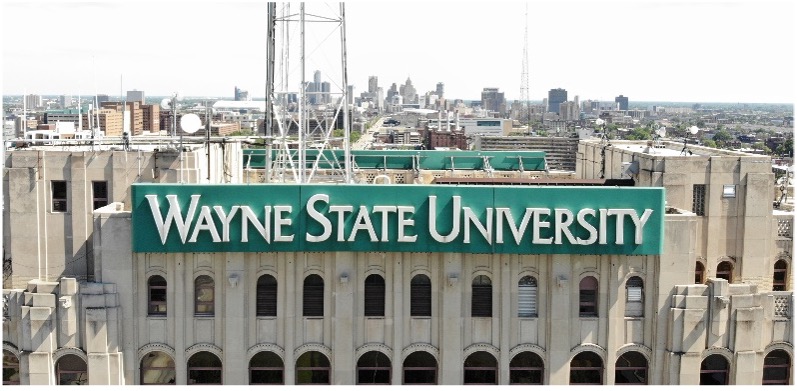 Since its founding as a medical college in 1868, Wayne State University is Michigan’s only urban public research university located in the city of Detroit, playing a vital role in the education and health of Detroiters. Wayne State is designated as a Carnegie R1, doctoral-granting university with very high research activity. WSU has also achieved recognition for its efforts in the community by earning the Carnegie Community Engagement classification, as well as nationally through its designation as an Innovation and Economic Prosperity University by the Association of Public and Land-Grant University. The University is comprised of 13 schools and colleges: College of Education; College of Engineering; College of Fine, Performing and Communication Arts; Graduate School; Law School; College of Liberal Arts and Sciences; the Mike Ilitch School of Business; School of Information Sciences; Irvin D. Reid Honors College; School of Social Work; School of Medicine; College of Nursing; and the Eugene Applebaum College of Pharmacy and Health Sciences. As Detroit’s seventh-largest employer, Wayne State has 2,394 faculty members (1,472 full time), more than 4,500 regular staff, and approximately 1,600 student and part-time employees.
Since its founding as a medical college in 1868, Wayne State University is Michigan’s only urban public research university located in the city of Detroit, playing a vital role in the education and health of Detroiters. Wayne State is designated as a Carnegie R1, doctoral-granting university with very high research activity. WSU has also achieved recognition for its efforts in the community by earning the Carnegie Community Engagement classification, as well as nationally through its designation as an Innovation and Economic Prosperity University by the Association of Public and Land-Grant University. The University is comprised of 13 schools and colleges: College of Education; College of Engineering; College of Fine, Performing and Communication Arts; Graduate School; Law School; College of Liberal Arts and Sciences; the Mike Ilitch School of Business; School of Information Sciences; Irvin D. Reid Honors College; School of Social Work; School of Medicine; College of Nursing; and the Eugene Applebaum College of Pharmacy and Health Sciences. As Detroit’s seventh-largest employer, Wayne State has 2,394 faculty members (1,472 full time), more than 4,500 regular staff, and approximately 1,600 student and part-time employees.
Wayne State is the third largest among Michigan’s public universities, offering approximately 350 academic programs delivered by expert faculty. Wayne State serves approximately 24,000 students. Wayne State stands out as an institution of access and opportunity for students from all backgrounds and is proud of its status as Michigan’s most diverse public university with 16% of its students identifying as Black/African American, 15% as Asian, 10% as Middle Eastern/North African, and 7% as Hispanic or Latino. More importantly, 40% of its undergraduate population are first-generation college students and nearly half are Pell-eligible. In addition, Wayne State’s current student body includes students from 80 countries and the University’s global engagement effort has led to partnerships with institutions in the Middle East, Latin America, Europe, Korea, India, and China. Third Way rankings identify Wayne State as in its top tier for social mobility. Following their Wayne State experience, approximately 80% of alumni remain in Michigan, establishing the University as a significant talent pipeline for the region and a significant contributor to the state economy.
Serving the Detroit metropolitan region and the state of Michigan in its economic reinvigoration, Wayne State’s 200-acre campus lies in the heart of Midtown, a cultural and historic district in Detroit, and plays a critical role as a steadfast partner in the city’s economic life. In large part due to its unique positioning as Michigan’s only urban public research university, combined with its academic, research, and teaching excellence, Wayne State attracts students from across the state, nation, and beyond. With research expenditures exceeding $240M, Wayne State serves a prominent role in conducting research and furthering knowledge with a community impact. In addition, the University is a proud member of the University Research Corridor, along with the University of Michigan and Michigan State University, the only national innovation cluster composed exclusively of public institutions which generates 95% of statewide research and supports economic growth across Michigan.  In addition to Wayne State’s faculty being recognized for their research in chemistry, physics, biomedical and health sciences, mobility and automotive safety, neurosciences, alternative/sustainable energy, and nanoscience, the University has been named the No. 2 medical institution for research in Michigan and is home to a National Cancer Institute-designated Comprehensive Cancer Center, a top-ranked physician assistant program in Michigan, a Nurse Anesthesia program ranked in the country's top 20%, the Masters and Doctorate of Nursing Programs both in the top 50 in the country and the undergraduate nursing program ranked in the top 5% in the country by U.S. News & World Report. Moreover, Wayne State’s dedication to addressing biomedical challenges across a broad spectrum is evidenced in the University’s Integrative Biosciences Center (IBio) —a $90 million facility dedicated to eliminating health disparities in Detroit.
In addition to Wayne State’s faculty being recognized for their research in chemistry, physics, biomedical and health sciences, mobility and automotive safety, neurosciences, alternative/sustainable energy, and nanoscience, the University has been named the No. 2 medical institution for research in Michigan and is home to a National Cancer Institute-designated Comprehensive Cancer Center, a top-ranked physician assistant program in Michigan, a Nurse Anesthesia program ranked in the country's top 20%, the Masters and Doctorate of Nursing Programs both in the top 50 in the country and the undergraduate nursing program ranked in the top 5% in the country by U.S. News & World Report. Moreover, Wayne State’s dedication to addressing biomedical challenges across a broad spectrum is evidenced in the University’s Integrative Biosciences Center (IBio) —a $90 million facility dedicated to eliminating health disparities in Detroit.
Wayne State’s Prosperity Agenda
As an urban public research institution, Wayne State plays a unique and influential role in Detroit, preparing students for life-changing careers, advancing the health and well-being of its local communities, and contributing significantly to Michigan’s economic growth. Conceived through a close partnership between President Espy and Wayne State stakeholders, the University’s Prosperity Agenda sets forth a focused purpose to support Wayne State in making a prosperous future for all stakeholders a reality. Specifically, the Prosperity Agenda sets forth three cornerstone ideals:
- Accelerate Mobility for Our Students – We recognize the power of education to positively alter students' life trajectories, fostering generational change and societal advancement. We serve a diverse student body and provide access and success to underserved communities, supported by our top-tier faculty’s engaging teaching methods and “learning by doing” experiences that cultivate the competencies that prepare our graduates for successful careers.
-
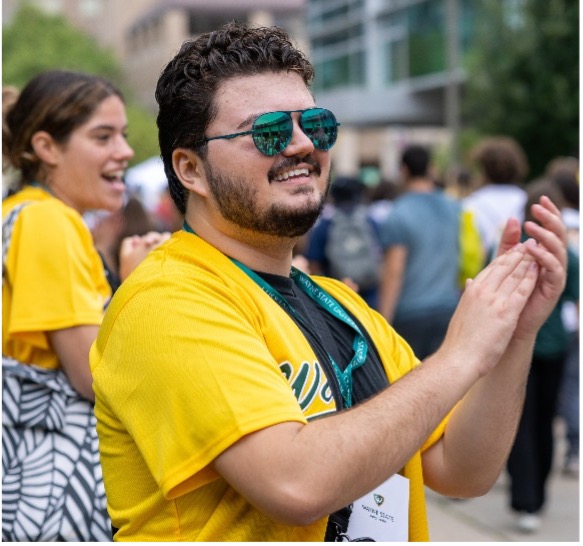 Empower Health for Our Urban Neighborhoods – Wayne State plays a vital role in the health of Detroiters, serving in all major Detroit health systems and providing care in local neighborhoods. By unleashing our faculty, students and university leaders to engage even further with our community, we can expand cutting-edge care and address health disparities to build healthier, more resilient neighborhoods in Detroit and beyond.
Empower Health for Our Urban Neighborhoods – Wayne State plays a vital role in the health of Detroiters, serving in all major Detroit health systems and providing care in local neighborhoods. By unleashing our faculty, students and university leaders to engage even further with our community, we can expand cutting-edge care and address health disparities to build healthier, more resilient neighborhoods in Detroit and beyond. - Fuel Innovation for Our Competitiveness – By fostering innovation and entrepreneurship, we strive to propel Michigan's competitiveness in 21st century commerce. Through the support of TechTown and by cultivating a campus that is “open for business,” we will create more solutions to the challenges endemic to urban areas and ensure a robust economy that benefits all.
Wayne State’s Prosperity Agenda serves as an organizing framework to guide the University toward achieving the goals set forth in the strategic plan, Our Moment in Time, and provides a shared focus on bettering the lives of students, supporting faculty in pushing the boundaries of knowledge and innovation further, and strengthening the bonds that interconnect Wayne State and the community it serves.
President Kimberly Andrews Espy
Dr. Kimberly Andrews Espy was appointed the 13th president of Wayne State University in August 2023. A leader with more than 25 years of experience in higher education, President Espy previously served as Provost and Senior Vice President for Academic Affairs at the University of Texas at San Antonio (UTSA). Since her arrival, she has embraced Wayne State’s urban-serving, public research university mission through engagements with students, faculty, staff, community, alumni, and governmental stakeholders. In November 2023, she launched the College to Career initiative to expand student success by intentionally connecting with industry, small business, community, service, and governmental employers for career preparation that can advance student social and economic mobility, enhance the health and well-being of local families, and promote regional innovation and business competitiveness.
During her tenure at UTSA, President Espy championed social and economic opportunity by promoting affordable access to a top-quality research university education, moving UTSA to a Carnegie R1 classification, joining the Alliance of Hispanic Serving Research Universities after earning the Seal of Excelencia from Excelencia in Education for its commitment to serving Hispanic students, and recruiting and retaining outstanding diverse faculty. Prior to serving as UTSA’s provost, President Espy was Senior Vice President for Research at the University of Arizona. Research and development awards reached record highs, and she served on the leadership team that established an historic academic partnership with Banner Health and worked with industry and government partners to create the Defense Security Research Institute supporting mission-focused applications.
President Espy is an elected fellow of the American Association for the Advancement of Science. Her work has been funded by the National Institutes of Health since 2002, and she has earned more than $22 million in funding to study young children’s control of attention spans, something that promotes later learning, mental health, and health outcomes, and is affected by medical, social, and environmental factors.
Position Summary
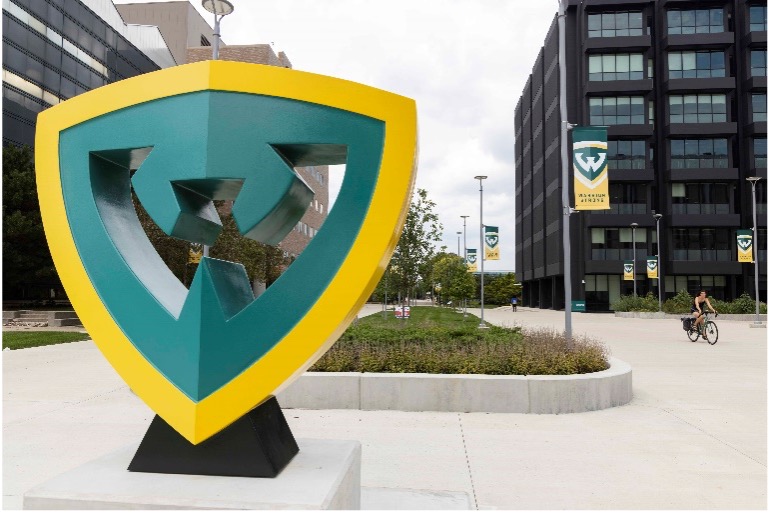 Reporting to the President and serving as a member of the University Leadership Council, the Senior Vice President for Health Affairs will oversee Wayne State’s health sciences enterprise and clinical relationships/affiliations and will support, coordinate, and oversee the activities of the School of Medicine, the College of Nursing, and the Eugene Applebaum College of Pharmacy and Health Sciences, in addition to a new School of Public Health for which university-wide planning is underway. The Division of Health Affairs will also administer other key cross-cutting and interdisciplinary functions, such as the Office of Women’s Health, as WSU strives to address the health concerns of our community and reduce persistent disparities in health outcomes endemic to the region.
Reporting to the President and serving as a member of the University Leadership Council, the Senior Vice President for Health Affairs will oversee Wayne State’s health sciences enterprise and clinical relationships/affiliations and will support, coordinate, and oversee the activities of the School of Medicine, the College of Nursing, and the Eugene Applebaum College of Pharmacy and Health Sciences, in addition to a new School of Public Health for which university-wide planning is underway. The Division of Health Affairs will also administer other key cross-cutting and interdisciplinary functions, such as the Office of Women’s Health, as WSU strives to address the health concerns of our community and reduce persistent disparities in health outcomes endemic to the region.
As Wayne State’s senior leader responsible for its health affairs-related initiatives and operations, the SVP for Health Affairs will focus their efforts on leading health sciences-wide clinical relationships and affiliations in support of and in coordination with the academic deans. With this in mind, the SVP for Health Affairs will coordinate and collaborate with the Provost and Senior Vice President for Academic Affairs, Dr. Laurie Lauzon Clabo, who will retain final approval for all faculty hires, academic programs and standards, and matters pertaining to student affairs. In leading a highly impactful division that spans the University’s health sciences colleges, the SVP for Health Affairs will be a key figure in increasing and enhancing interprofessional education, interdisciplinary research, and integrated multidisciplinary service/outreach, with a particular focus on addressing the health needs of Detroit and its surrounding communities.
The SVP for Health Affairs will endeavor to strengthen and expand Wayne State’s efforts toward serving the health needs of our communities through developing and optimizing the University’s institutional relationships with the many health service delivery organizations and community partners across the Detroit metropolitan area and region. As the health care landscape continues to evolve toward increased value-based care delivered increasingly in outpatient and community settings, the SVP for Health Affairs will be responsible for positioning Wayne State for continued success in this environment, leveraging its notable record of impact via traditional hospital-centered training and care.
Institutional Priorities
In the coming years, Wayne State’s Senior Vice President for Health Affairs will have the opportunity to make an impact in several crucial areas:
- Vision / Plans for the Future: The SVP for Health Affairs will play a pivotal role in developing a shared vision for the future of Wayne State’s health sciences enterprise that will support its clinical operations, develop new and enhance existing clinical relationships and affiliations, and leverage the University’s research and scholarly efforts on behalf of its communities. In leveraging the collective strength of Wayne State’s myriad educational and research strengths, the SVP for Health Affairs will further enhance the University’s impact in Detroit and the larger region.
-
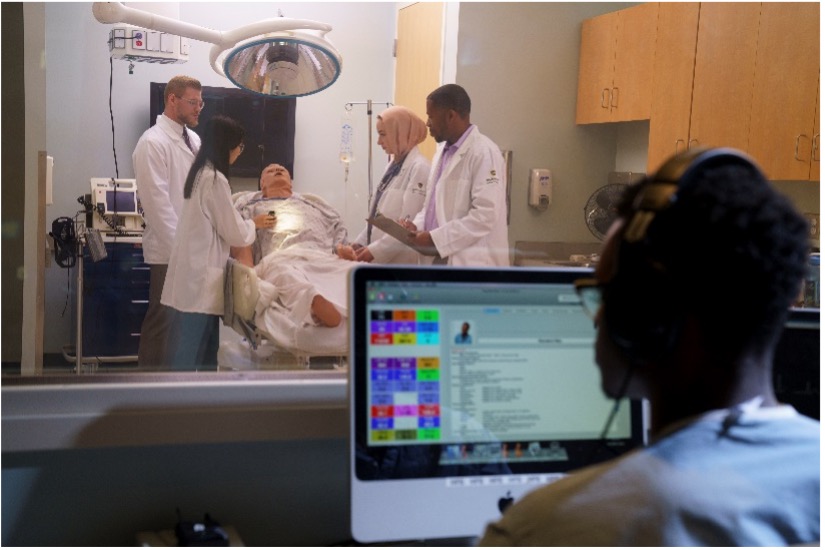 Leading Within a Complex, Multifaceted University: Given the scope of Wayne State’s presence in Detroit and the region, the SVP for Health Affairs must be a visible and vocal leader on campus. The role will effectively employ existing, and develop new, avenues of communication between the health science enterprise and the University’s various academic, research, and educational entities. In doing so, the SVP for Health Affairs will foster an environment based on inclusivity and collaboration that will lead to the free-flow of ideas and excitement for the conception and pursuit of new interdisciplinary and interprofessional initiatives and partnerships -- strengthening ties between faculty and staff on campus and healthcare-focused organizations externally.
Leading Within a Complex, Multifaceted University: Given the scope of Wayne State’s presence in Detroit and the region, the SVP for Health Affairs must be a visible and vocal leader on campus. The role will effectively employ existing, and develop new, avenues of communication between the health science enterprise and the University’s various academic, research, and educational entities. In doing so, the SVP for Health Affairs will foster an environment based on inclusivity and collaboration that will lead to the free-flow of ideas and excitement for the conception and pursuit of new interdisciplinary and interprofessional initiatives and partnerships -- strengthening ties between faculty and staff on campus and healthcare-focused organizations externally. - Strengthening Interprofessional and Interdisciplinary Efforts: The SVP for Health Affairs will inherit an organization that is ready to build upon existing strengths and identify new areas for enhancing interprofessional and interdisciplinary efforts. The SVP for Health Affairs will play a critical role in the design, implementation, and evaluation of Wayne State’s interprofessional and interdisciplinary offerings to effectively prepare students for the workplace and enhance the University’s commitment to academic excellence and service. Through their work, the SVP for Health Affairs will bolster Wayne State's reputation for advancing the quality of health care in the region and enhancing the educational experience of current and future graduates.
-
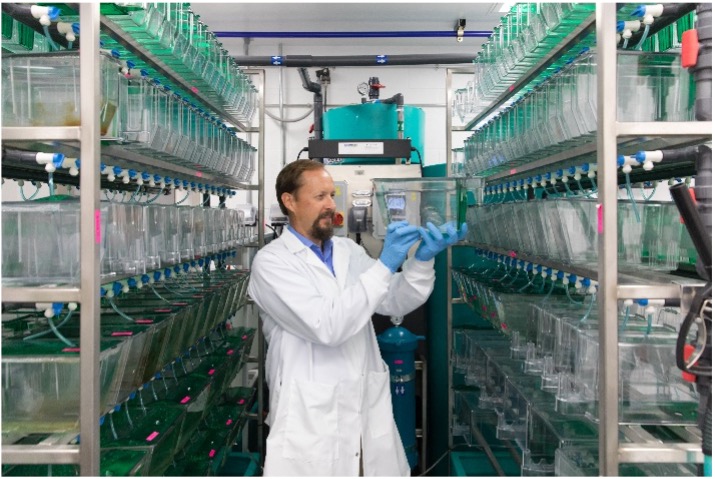 Increasing Research Productivity: The SVP for Health Affairs will partner with the Provost and Senior Vice President for Academic Affairs and the Vice President for Research to strengthen the Health Sciences research portfolio overall. In particular, the SVP for Health Affairs will serve as a catalyst for creating new and exciting opportunities to further enhance research productivity and will play a lead role in partnering with key stakeholders to identify and secure new research funding, increase scholarly publications, and build partnerships that capitalize on Wayne State’s health sciences infrastructure.
Increasing Research Productivity: The SVP for Health Affairs will partner with the Provost and Senior Vice President for Academic Affairs and the Vice President for Research to strengthen the Health Sciences research portfolio overall. In particular, the SVP for Health Affairs will serve as a catalyst for creating new and exciting opportunities to further enhance research productivity and will play a lead role in partnering with key stakeholders to identify and secure new research funding, increase scholarly publications, and build partnerships that capitalize on Wayne State’s health sciences infrastructure. - Developing External Relationships: Serving as a highly-visible and influential leader in Detroit and beyond, the SVP for Health Affairs will step into a role that will provide a significant platform for this individual to engage influential stakeholders in Detroit, including local community leaders, healthcare entities, government, non-profit organizations, and industry. The SVP for Health Affairs must be prepared not only to represent and advocate for Wayne State’s needs, but also leverage opportunities for partnerships with these groups.

- Enhancing Infrastructure and Leading Positive Change: The SVP Health Affairs must be a creative leader who is willing to take calculated risks as the University seeks to increase its research funding and footprint and the impact of Wayne State’s clinical operation. The SVP for Health Affairs must understand and support the balance between supporting current areas of excellence, while leading the discussion surrounding new areas for growth and how to best provide the necessary infrastructure for achieving the University’s strategic goals.
- Developing and Retaining a High-Performing Team: The SVP for Health Affairs will be responsible for leading an organization that will partner with a wide range of units within the Health Affairs organization and throughout the University. This will require the ability to lead and empower a team of individuals that will engage with many different collaborators from diverse backgrounds across Wayne State. To be successful, the SVP for Health Affairs must be committed to fostering an environment that promotes and values collegiality, transparency, and teamwork. Moreover, the SVP for Health Affairs will provide the leadership necessary to cultivate an environment that encourages entrepreneurism, rewards success, and supports the professional development of staff as they serve as leaders in their respective areas.
-
 Communication and Transparency: The SVP for Health Affairs will be expected to create a culture that is committed to effectively and proactively communicating with the wide-range of internal and external constituents that work with or are served by the Division of Health Affairs. Therefore, the SVP for Health Affairs must possess strong listening skills, the ability to engage stakeholders in meaningful discussions, and an openness in providing information about the decision-making process and how decisions will impact stakeholders as it strives to fulfill its mission and achieve its goals.
Communication and Transparency: The SVP for Health Affairs will be expected to create a culture that is committed to effectively and proactively communicating with the wide-range of internal and external constituents that work with or are served by the Division of Health Affairs. Therefore, the SVP for Health Affairs must possess strong listening skills, the ability to engage stakeholders in meaningful discussions, and an openness in providing information about the decision-making process and how decisions will impact stakeholders as it strives to fulfill its mission and achieve its goals.
Qualities and Characteristics
The successful candidate must be able to recognize and act upon the unique characteristics of Wayne State, the city of Detroit, and the region. This individual will have a broad understanding of and be responsive to the competitive challenges, technological opportunities, and cutting-edge practices required for institutions and students to be successful in the rapidly-changing academic and health sciences landscape. Specifically, it is desired that the SVP for Health Affairs exhibit many of the following experiences, abilities, and skills:
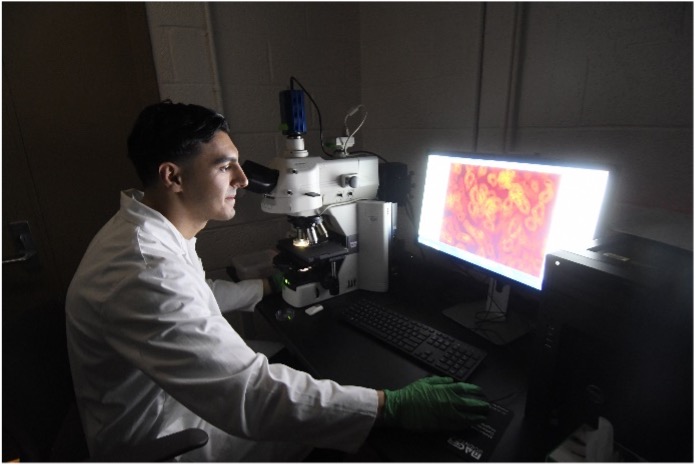
- The ability to develop shared strategic goals and opportunities and identify effective collaborations to increase Wayne State’s clinical, research, and educational efforts internal and external to the University.
- Experience with health-related research and education; the capability to integrate effectively Wayne State’s health sciences colleges with the clinical enterprise.
- A deep appreciation and understanding of the current issues and trends in healthcare, including funding, and the challenges associated with academic health sciences.
- An entrepreneurial spirit with the ability to serve as a visionary and strategic thinker.
- A leader with knowledge, passion, and experience in successfully building alignments and motivating leaders within multifaceted organizations that include a robust health sciences enterprise.
- A strong and distinguished record of impact that exhibit a commitment to academic excellence (e.g., research and scholarly publications)
- The ability to foster an environment that enhances efforts to secure additional federal and private grant funding, increase research productivity. and advance the University’s research mission and impact in addressing the health care needs of Detroit’s residents and the region.
- Evidence of a commitment to academic quality, including outstanding teaching, scholarship, and service.
- Experience in contemporary interprofessional education (IPE) and interprofessional collaborative practice (IPCP)
- A genuine intellectual curiosity for disciplines beyond their own and a desire to engage with others from these areas.
- The ability to effectively inspire faculty, staff, and other Wayne State constituents to further the Division of Health Affairs’ clinical, research, and educational missions.
- The ability to work closely and build effective alliances with faculty from a multitude of disciplines, both within and outside of the health sciences, in an environment of shared governance.
- An understanding and appreciation of experiential learning and its power to enhance student learning.
- A proven ability to enhance diversity among students, faculty, staff, and leadership.
- The ability to be a consensus builder but make decisions in a decisive and timely manner.
- A commitment to interprofessional efforts and the identification and creation of opportunities for meaningful cross-departmental collaboration in research, education, and practice.
- The ability to form effective partnerships with industry and other healthcare-related entities.
- A strong fit with the University’s mission and values.
- A respect and support for the University’s traditions and goals.
-
 Demonstrated ability to utilize policy and political processes effectively to promote institutional missions and goals.
Demonstrated ability to utilize policy and political processes effectively to promote institutional missions and goals. - Interest and commitment to engage students in the life of the health sciences enterprise.
- Ability to build consensus, with the interpersonal and communications skills required to form productive partnerships and collaborate well with academic and medical constituencies, the health sciences, and University and the community at large.
- Experience in external and community relations and governmental advocacy to build strong and productive ties, propel outreach efforts, and capitalize on the region’s willingness to partner with Wayne State.
Qualifications
Candidates for the position of SVP for Health Affairs at Wayne State should possess the following qualifications and experience:
- An M.D. degree or other earned doctorate/terminal degree in the health-related field; appropriate board certification or comparable professional recognition; and the credentials to qualify as a tenured full professor or senior appointment appropriate for the candidate’s background.
- Although administrative leadership experience in higher education is preferred, Wayne State is open to applications from candidates who have achieved noteworthy success in their respective fields beyond higher education to apply. These candidates must have demonstrated experience and a record of success working in a complex healthcare-related organization where success is achieved in partnership and collaboration rather than solely through direct authority.
- A strong personal record of impact through research and scholarship, mentorship or training, publication, funding, and leadership as appropriate for the discipline.
- Prior senior administrative experience at a complex healthcare organization or health-related college or school that includes substantial interaction with multiple academic health- and non-health academic units.
- Demonstrated effective administrative experience, including fiscal oversight and supervision of staff.
- Proven leadership in the advancement of multi-disciplinary research and collaboration.
- Demonstrated record of support for diversity and inclusion.
- Excellent written and oral communication skills.
- The ability to listen, persuade, show appreciation, and build consensus with interdisciplinary teams.
Detroit, MI
 Detroit is a city on the move -- the largest city in Michigan and a major port on the Detroit River, an international waterway that connects the western Great Lakes to Lake Erie and the Saint Lawrence Seaway. In 2021, the city had a population of approximately 633,000, with a surrounding metropolitan area of more than 5 million. The city’s population is primarily African American and increasingly diverse, with new residents representing a spectrum of ages, races, and cultures eager to participate in Detroit’s ongoing transformation. The southwest Detroit area has vibrant and growing Hispanic and Latino communities, and the city of Dearborn has the largest Arab-American community in the United States. The combined Detroit-Windsor (Ontario) metropolitan area, a critical commercial center on the U.S.-Canada border, has a total population of 5.7 million. About 25% of U.S.-Canadian trade crosses Detroit’s Ambassador Bridge, with a second bridge under construction. Detroit is synonymous with the American creative innovation, including the home of the US automobile industry and an important source of popular music legacies celebrated in the city's two familiar nicknames, “The Motor City” and “Motown.”
Detroit is a city on the move -- the largest city in Michigan and a major port on the Detroit River, an international waterway that connects the western Great Lakes to Lake Erie and the Saint Lawrence Seaway. In 2021, the city had a population of approximately 633,000, with a surrounding metropolitan area of more than 5 million. The city’s population is primarily African American and increasingly diverse, with new residents representing a spectrum of ages, races, and cultures eager to participate in Detroit’s ongoing transformation. The southwest Detroit area has vibrant and growing Hispanic and Latino communities, and the city of Dearborn has the largest Arab-American community in the United States. The combined Detroit-Windsor (Ontario) metropolitan area, a critical commercial center on the U.S.-Canada border, has a total population of 5.7 million. About 25% of U.S.-Canadian trade crosses Detroit’s Ambassador Bridge, with a second bridge under construction. Detroit is synonymous with the American creative innovation, including the home of the US automobile industry and an important source of popular music legacies celebrated in the city's two familiar nicknames, “The Motor City” and “Motown.”
In addition to the Detroit Medical Center hospitals, John Dingell VA Hospital, Henry Ford Health, Wayne County Health Department and numerous community clinics, Detroit’s Midtown neighborhood is home to Wayne State as well as to world-class museums, theatres, libraries, concert halls, and professional sports venues. Among the cultural institutions within walking distance of the main campus are the main branch of the Detroit Public Library, the Detroit Institute of Arts, the Charles H. Wright Museum of African American History, the Michigan Science Center, the Fisher Theatre, Detroit Children’s Museum, the Detroit Public Theatre, the Detroit Historical Museum, and Orchestra Hall. Midtown has been at the heart of growth connected to Detroit’s historical resurgence.
Application/Nomination Process
The Search Committee will begin reviewing applications immediately and will continue to accept applications and nominations until the position is filled. Applicants must submit a current curriculum vitae and a letter of interest describing relevant experience and interest in the position. Submission of materials via e-mail is strongly encouraged. Nomination letters should include contact information for the nominee. All nominations and applications will be handled in confidence.
Applications and letters of nomination should be submitted to:
 Alberto Pimentel, Managing Partner
Alberto Pimentel, Managing Partner
Sal Venegas Jr., Partner
6512 Painter Avenue, Whittier, CA 90601"
562-360-1353 (FAX)
Email: apsearch@spaexec.com
Refer to code “WSU-SVPHA” in subject line
Search committee
- Boris Pasche, Committee Co-chair, Chair, Department of Oncology, School of Medicine; President and Chief Executive Officer, Barbara Ann Karmanos Cancer Institute
- Debra Schutte, Committee Co-chair, Associate Dean, College of Nursing
- Boris Baltes, Sr. Associate Provost, Academic Affairs
- Linda Beale, Professor of Law
- Teena Chopra, Assistant Dean for Faculty Development, Professor and Chief of Infectious Diseases
- Nora Fritz, Associate Professor, Physical Therapy and Neurology, Director of Research, Health Care Sciences
- Sonia Hassan, Associate Vice President, Health Affairs
- Mark Juzych, Chair, Ophthalmology, School of Medicine
- Dahlia Khalil, Associate Professor, College of Nursing
- Patrick Lindsey, Vice President, Government and Community Affairs
- Sara Maher, Associate Dean, Health Sciences
- Carmen McIntyre, Interim Chair, Neurosurgery
- Ezemenari Obasi, Vice President of Research
- Elena Past, Dean, Honors College
- Aline Saad, Associate Professor, Pharmacy
- Tara Walker, Assistant Professor, Clinical, College of Nursing
- Patricia Wren, Chair, Public Health, College of Liberal Arts and Sciences
- Angela Griffith, Office of the President (contact for search questions)
- Jake Wilson, Office of the Provost and Academic Affairs (contact for search questions)
Wayne State University is an equal opportunity employer. No person will be discriminated against or harassed in employment because of race, color, religion, gender, national origin, age, disability, familial status, marital status, arrest record, height, weight, sexual orientation, qualified Vietnam era veterans, qualified special disabled veterans, recently separated veterans, and other protected veterans, or any other characteristic protected by applicable federal or state law.